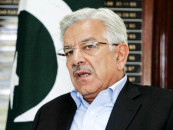SC will only focus on Suri’s ruling: CJP
Top judge says court can’t indulge in policy matters

Chief Justice of Pakistan Umar Ata Bandial on Tuesday observed that the court would not indulge in policy matters and only focus on the legality of National Assembly Deputy Speaker Qasim Suri's ruling on a no-trust motion against Prime Minister Imran Khan.
The country’s top judge was hearing the arguments of PML-N’s attorney Makhdoom Ali Khan against the rejection of a no-confidence motion by the deputy speaker.
Suri had dismissed the motion on the grounds that it was linked to a “foreign conspiracy” to oust the PTI government.
He had ruled that motion was contradictory to Article 5 of the Constitution.
The two clauses under Article 5 state that loyalty to the State was the basic duty of every citizen and obedience to the Constitution and law is the inviolable obligation of every citizen wherever he may be and of every other person for the time being within Pakistan.
Later, CJP Bandial took suo motu notice of the development and formed a five-judge larger bench, headed by himself and also comprising Justice Ijaz-ul-Ahsan, Justice Mohammad Ali Mazhar, Justice Munib Akhtar and Justice Jamal Khan Mandokhail, to hear the case.
The PML-N lawyer told the bench that if the Supreme Court wanted to check loyalty of the members and leadership of the opposition parties, it could opt for an “in-camera” briefing in the chamber from the head of the premier agency of the country.
He added that the Suri's ruling was against the spirit of the Constitution. “Article 95 of the Constitution has been left ‘redundant' by this ruling.”
Article 95 pertains to the no-confidence motion against the prime minister.
He further argued that Article 69 of the Constitution did not prevent the court from examining the matter.
According to Article 69, the validity of any proceedings in parliament shall not be called in question on the ground of any irregularity of procedure.
The CJP replied that the court would was only looking at the law and Constitution and wanted to see if it could review the ruling of the deputy speaker.
He added that the court did not interfere in the state or foreign policy.
Justice Ahsan agreed with the CJP and noted that the court only wanted to see constitutional matters for now.
Justice Munib Akhtar noted that if the lawyer wanted the court to adjudicate the ruling, then every act of the speaker would be challenged in the superior courts.
He added that the NA and provincial assemblies were masters of their respective Houses.
“The distribution of powers is also enshrined in the Constitution.”
Justice Mandokhail asked as to whether or not the ruling of the NA speaker was illegal or came under purview of procedural lapse.
The PML-N lawyer replied that it was not only a procedural lapse, but “unconstitutional” as well.
He questioned the nomination of former chief justice Gulzar Ahmed as the caretaker prime minister by the PTI at a time when the bench was adjudicating the matter.
Khan also questioned the transfer of power from the speaker to the deputy speaker.
"We have referred to six court verdicts that clarify the jurisdiction of Article 69," the PML-N lawyer said, adding that the speaker had confirmed the deputy speaker's ruling.
As the hearing started, the SC sought the record of NA proceedings conducted on the no-confidence motion filed against interim PM Imran.
PPP Senator Raza Rabbani said the court had to examine the extent of the "immunity" of parliamentary proceedings, adding that whatever had happened could only be termed as “civilian martial law”.
He told the court that the NA session held on March 21 was adjourned after offering prayers for a deceased lawmaker, adding that this had not happened in the past.
The PPP senator maintained that a no-confidence motion was also submitted against Asad Qaiser which limited the power of the speaker. “Assemblies cannot be dissolved during the no-confidence process.”
After that, the PML-N's counsel told the court that the no-confidence motion was submitted to the NA with the signatures of 152 lawmakers while 161 had voted in favour of tabling it. "After that, proceedings were adjourned till March 31."
As per the rules, the lawyer maintained, a debate on the no-confidence motion was supposed to be conducted on March 31. However, he added that a debate was not held and voting was also not conducted on April 3.
The lawyer contended that that a no-confidence motion could not be dismissed by the speaker once it is tabled in the NA.
The CJP asked whether or not a debate was held on the no-confidence motion. The PML-N lawyer replied that it was not.
The CJP also asked whether a majority of lawmakers were present in parliament when the no-confidence resolution against the prime minister was tabled, noting that it required the support of 20% of the lawmakers.
He observed that constitutional provisions could not be trampled through rules.
The CJP also questioned at what time would the session of the Punjab Assembly would on Wednesday (today).
Advocate General Punjab Ahmad Awais assured the court that Punjab Assembly's session would be held on Wednesday in accordance with law and the Constitution.
PML-N’s Senator Azam Nazeer Tarar told the court that the provincial government was conspiring to suspend the membership of around 40 opposition MPAs.
The advocate general replied that Tarar was making a false assertion.
Usman Mansoor Awan, who is representing the Supreme Court Bar Association, started presenting his arguments.
The court adjourned the hearing till Wednesday (today).



















COMMENTS
Comments are moderated and generally will be posted if they are on-topic and not abusive.
For more information, please see our Comments FAQ